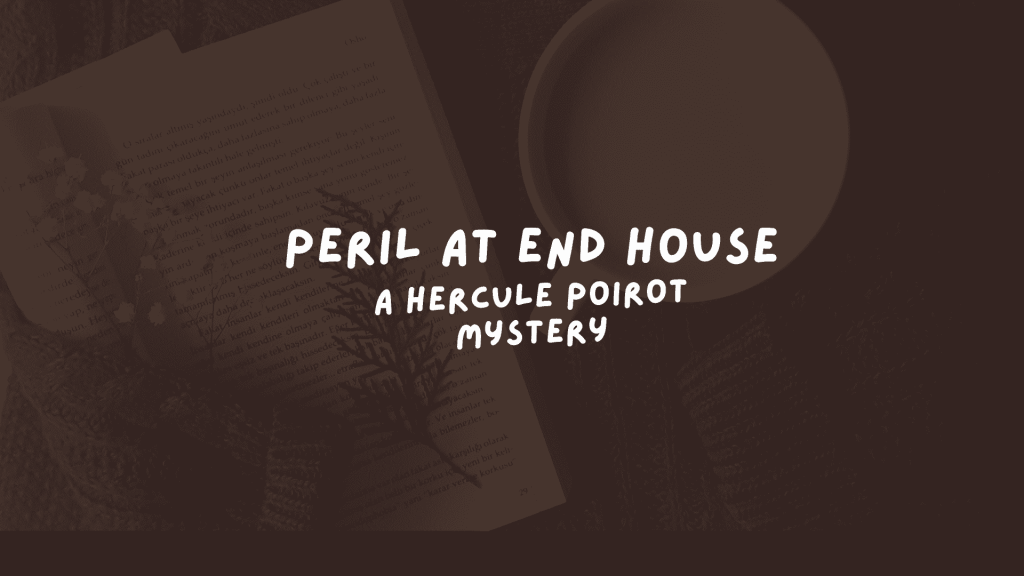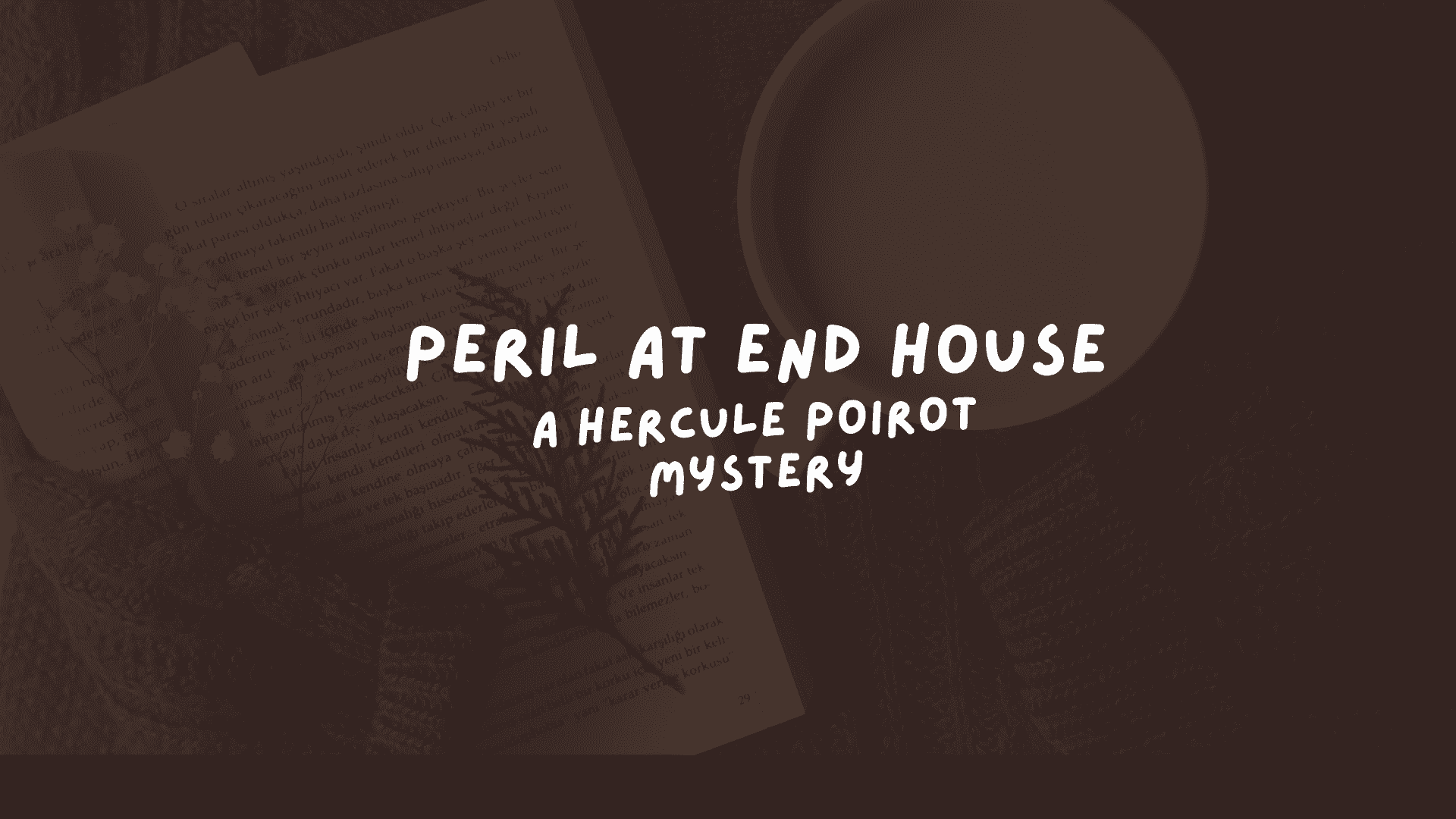Peril at End House Chapter-4: “Peril at End House” by Agatha Christie is a detective novel in which Hercule Poirot investigates a series of mysterious incidents that befall Nick Buckley, the owner of End House, a large country estate in England. Poirot soon realizes that Nick’s life is in danger and must race against time to uncover the truth. As he delves deeper into the case, he encounters a colorful cast of characters, including Nick’s friends and acquaintances, who all seem to have a motive for wanting Nick dead. Will Poirot be able to solve the case before it’s too late? Read on to find out.
Peril at End House Chapter-4: There Must Be Something!
‘Poirot,’ I said, as soon as we were out on the road. ‘There is one thing I think you ought to know.’ ‘And what is that, mon ami?’
I told him of Mrs. Rice’s version of the trouble with the motor.
‘Tiens! C’est intéressant, ça. There is, of course, a type, vain, hysterical, that seeks to make itself interesting by having marvelous escapes from death and which will recount to you surprising histories that never happened! Yes, it is well known, that type there. Such people will even do themselves grave bodily injury to sustain the fiction.’
‘You don’t think that-‘

‘That Mademoiselle Nick is of that type? No, indeed. You observed, Hastings, that we had great difficulty in convincing her of her danger. And right to the end, she kept up the farce of half-mocking disbelief. She is of her generation, that little one. All the same, it is interesting what Madame Rice said. Why should she say it? Why say it even if it were true? It was unnecessary-almost gauche.’
‘Yes,’ I said. ‘That’s true. She dragged it into the conversation neck and crop-for no earthly reason that I could see.’
‘That is curious. Yes, that is curious. The little facts that are curious, I like to see appear. They are significant. They point the way.’
‘The way-where?’
‘You put your finger on the weak spot, my excellent Hastings. Where? Where indeed! Alas, we shall not know till we get there.’
‘Tell me, Poirot,’ I said. ‘Why did you insist on her getting this cousin to stay?’
Poirot stopped and waved an excited forefinger at me.
‘Consider,’ he cried. ‘Consider for one little moment, Hastings. How we are handicapped! How are our hands tied? To hunt down a murderer after a crime has been committed-c’est tout simple! Or at least it is simple to one of my abilities. The murderer has, so to speak, signed his name by committing the crime. But here there is no crime-and what is more we do not want a crime. To detect a crime before it has been committed-that is true of a rare difficulty.’
‘What is our first aim? The safety of Mademoiselle. And that is not easy. No, it is not easy, Hastings. We cannot watch over her day and night-we cannot even send a policeman in big boots to watch over her. We cannot pass the night in a young lady’s sleeping chamber. The affair bristles with difficulties.’
‘But we can do one thing. We can make it more difficult for our assassin. We can put Mademoiselle upon her guard and we can introduce a perfectly impartial witness. It will take a very clever man to get round those two circumstances.’
He paused, and then said in an entirely different tone of voice: ‘But what I am afraid of, Hastings-‘ ‘Yes?’
‘What I am afraid of is that he is a very clever man. And I am not easy in my mind. No, I am not easy at all.’
‘Poirot,’ I said. ‘You’re making me feel quite nervous.’
‘So am I nervous. Listen, my friend, that paper, the St Loo Weekly Herald. It was open and folded back at where do you think? A little paragraph that said, “Among the guests staying at the Majestic Hotel are M. Hercule Poirot and Captain Hastings.” Supposing-just supposing that someone had read that paragraph. They know my name-everyone knows my name-‘
‘Miss Buckley didn’t,’ I said, with a grin.
‘She is a scatterbrain-she does not count. A serious man-a criminal-would know my name. And he would be afraid! He would wonder! He would ask himself questions. Three times he has attempted the life of Mademoiselle and now Hercule Poirot arrives in the neighborhood. ‘Is that coincidence?’ he would ask himself. And he would fear that it might not be a coincidence. What would he do then?’
‘Lie low and hide his tracks,’ I suggested.
‘Yes-yes-or else-if he had real audacity, he would strike quickly -without wasting time. Before I had time to make inquiries-pouf, Mademoiselle is dead. That is what a man of audacity would do.’
‘But why do you think that somebody read that paragraph other than Miss Buckley?’
‘It was not Miss Buckley who read that paragraph. When I mentioned my name it meant nothing to her. It was not even familiar. Her face did not change. Besides she told us-she opened the paper to look at the tides-nothing else. Well, there was no tide table on that page.’
‘You think someone in the house-‘
‘Someone in the house or who has access to it. And that last is easy-the window stands open. Without doubt, Miss Buckley’s friends pass in and out.’
‘Have you any idea? Any suspicion?’
Poirot flung out his hands.
‘Nothing. Whatever the motive, it is, as I predicted, not obvious. That is the would-be murderer’s security-that is why he could act so daringly this morning. On the face of it, no one seems to have any reason for desiring little Nick’s death. The property? End House? That passes to the cousin-but does he particularly want a heavily mortgaged and very dilapidated old house? It is not even a family place so far as he is concerned. He is not a Buckley, remember? We must see this Charles Vyse, certainly, but the idea seems fantastic.’
‘Then there is Madame-the bosom friend-with her strange eyes and her air of a lost Madonna-‘
‘You felt that too?’ I asked, startled.
‘What is her concern in the business? She tells you that her friend is a liar. C’est gentil, ça! Why does she tell you? Is she afraid of something that Nick may say? Is that something connected to the car? Or did she use that as an instance, and was her real fear of something else? Did anyone tamper with the car, and if so, who? And does she know about it?’
‘Then the handsome blond, M. Lazarus. Where does he fit in? With his great automobile and his money. Can he possibly be concerned in any way? Commander Challenger-‘
‘He’s all right,’ I put in quickly. ‘I’m sure of that. A real pukka sahib.’
‘Doubtless, he has been to what you consider the right school. Happily, being a foreigner, I am free from these prejudices, and can make investigations unhampered by them. But I will admit that I find it hard to connect Commander Challenger with the case. In fact, I do not see that he can be connected.’
‘Of course, he can’t,’ I said warmly.
Poirot looked at me meditatively. ‘
Hastings, you have had an exceptional impact on me. Your intuition is so potent that it almost persuades me to follow it even when it’s wrong! You possess the admirable qualities of being honest, trustworthy, and easily believing, which unfortunately makes you an easy target for deceitful individuals. You’re the kind of person who puts money into dubious oil fields and imaginary gold mines. From hundreds like you, the swindler makes his daily bread. Ah, well-I shall study this Commander Challenger. You have awakened my doubts.’
‘My dear Poirot,’ I cried, angrily. ‘You are perfectly absurd. A man who has knocked about the world as I have-‘
‘Never learns,’ said Poirot, sadly. ‘It is amazing-but there it is.’
‘Do you suppose I’d have made a success of my ranch out in the Argentine if I were the kind of credulous fool you make out?’
‘Do not enrage yourself, mon ami. You have made a great success of it-you and your wife.’
‘Bella,’ I said, ‘always goes by my judgment.’
‘She is as wise as she is charming,’ said Poirot. ‘Let us not quarrel my friend. See, there ahead of us, it says Mott’s Garage. That, I think, is the garage mentioned by Mademoiselle Buckley. A few inquiries will soon give us the truth of that little matter.’
We duly entered the place and Poirot introduced himself by explaining that he had been recommended there by Miss Buckley. He made some inquiries about hiring a car for some afternoon drives and from there slid easily into the topic of the damage sustained by Miss Buckley’s car not long ago. Immediately the garage proprietor waxed voluble. The most extraordinary thing he’d ever seen. He proceeded to be technical. I, alas, am not mechanically minded. Poirot, I should imagine, is even less so. But certain facts did emerge unmistakably. The car had been tampered with. And the damage had been something quite easily done, occupying very little time.
‘So that is that,’ said Poirot, as we strolled away. ‘The little Nick was right, and the rich M. Lazarus was wrong. Hastings, my friend, all this is very interesting.’
‘What do we do now?’
‘We visit the post office and send off a telegram if it is not too late.’
‘A telegram?’ I said hopefully.
‘Yes,’ said Poirot thoughtfully. ‘A telegram.’
The post office was still open. Poirot wrote out his telegram and despatched it. He vouchsafed me no information as to its contents. Feeling that he wanted me to ask him, I carefully refrained from doing so.
‘It is annoying that tomorrow is Sunday,’ he remarked, as we strolled back to the hotel. ‘We cannot now call upon M. Vyse till Monday morning.’
‘You could get hold of him at his private address.’
‘Naturally. But that is just what I am anxious not to do. I would prefer, in the first place, to consult him professionally and to form my judgment of him from that aspect.’
‘Yes,’ I said thoughtfully. ‘I suppose that would be best.’
‘The answer to one simple little question, for instance, might make a great difference. If M. Charles Vyse was in his office at twelve-thirty this morning, then it was not he who fired that shot in the garden of the Majestic Hotel.’
‘Ought we not to examine the alibis of the three at the hotel?’
‘That is much more difficult. It would be easy enough for one of them to leave the others for a few minutes, a hasty egress from one of the innumerable windows-lounge, smoking room, drawing room, writing room, quickly undercover to the spot where the girl must pass the shot fired and a rapid retreat. But as yet, mon ami, we are not even sure that we have arrived at all the dramatis personae in the drama. There is the respectable Ellen and her so far unseen husband. Both inmates of the house and possibly, for all we know, with a grudge against our little Mademoiselle. There are even unknown Australians at the lodge. And there may
be others, friends, and intimates of Miss Buckley’s whom she has no reason for suspecting and consequently has not mentioned. I cannot help feeling, Hastings, that there is something behind this-something that has not yet come to light. I have a little idea that Miss Buckley knows more than she told us.’
‘You think she is keeping something back?’
‘Yes.’
‘Possibly with an idea of shielding whoever it is?’
Poirot shook his head with the utmost energy.
‘No, no. As far as that goes, she gave me the impression of being utterly frank. I am convinced that as regards these attempts on her life, she was telling all she knew. But there is something else-something that she believes has nothing to do with. And I should like to know what that something is.
For I-I say it in all modesty-am a great deal more intelligent than petite comme ça . I, Hercule Poirot, might see a connection where she sees none. It might give me the clue I am seeking. For I announce to you, Hastings, quite frankly and humbly, that I am as you express it, all on the sea. Until I can get some glimmering of the reason behind all this, I am in the dark. There must be something -some factor in the case that I do not grasp. What is it? Je me demande ça sans cesse. Qu’est-ce que c’est? ‘
‘You will find out,’ I said, soothingly.
‘So long,’ he said sombrely, ‘as I do not find out too late.’

